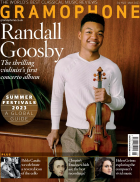Texte paru dans: / Appeared in: |
|
|
Outil de traduction |
|
|
Alarcón’s propulsive interpretation, recorded live in concert last July, is 10 minutes quicker than Paul McCreesh’s landmark recording (Archiv, 3/99). Even taking into account the omission of the Overture’s concluding Allegro, the undue rush causes adverse consequences to musico-dramatic lucidity. ‘From the censer curling rise’ has punchy choral attack and visceral brassiness, and yet manic rapidity prevents rhetorical clarity and there is hardly any audible separation of the Namur Chamber Choir’s antiphonal exchanges. Andreas Wolf tries to pull back the pace of the Levite’s ‘Praise ye the Lord for all his mercies past’ to something closer to Handel’s Andante larghetto but he fights in vain against the impatient orchestra. The famous Part 3 Symfony is brisk even by present-day sprinting standards; dextrous oboe duet passages lack enough space to relish their sonorities. Disappointingly, the chorus ‘Praise the Lord with harp and tongue’ hurries past vital details and makes next to nothing of the interjection of Martin Luther’s ‘Heilig ist Gott’ as a cantus firmus for the words ‘God alone is just and wise’. Ana Maria Labin performs the First Harlot’s desperate petitions with intense theatricality, although Alarcón’s extremity of radical pulling back or galloping accelerations are unconvincing (‘Can I see my infant gor’d’ is ruined). ‘Beneath the vine’ is paced and articulated to perfection by the Millenium Orchestra, although Labin’s forceful and unsteady singing cuts against the air’s delicate pastoral charm. Gwendoline Blondeel’s heavily accented Pharoah’s Daughter is less bothersome than whimsical tinkering with Handel’s instrumentation in several of her numbers; the newlyweds’ duet ‘Welcome as the dawn of day’ is sung with smouldering desire but unauthorised flutes (doubling the violins) is an unwise intervention that undermines Handel’s reservation of the instruments’ special effect in the chorus ‘May no rash intruder disturb their soft hours’. In the event, the nightingale chorus misfires because of an obtrusive harpsichord and the disappointing absence of whispered seductiveness. On the plus side, Matthew Newlin communicates words crisply in ‘See the tall palm’ (featuring the notorious tongue-twister ‘on Jordan’s sedgy side’). Solomon’s accompagnato ‘Almighty pow’r’ is performed eloquently by Christopher Lowrey, with strings and divided bassoons, and the countertenor’s ‘What tho’ I trace each herb and flower’ has velvety beauty and tasteful ornamentation. The finest stretch of Alarcón’s performance is Part 3’s masque presenting different musical moods that ‘rouse each passion’: ‘Musick, spread thy voice around’ is shaped gorgeously (Alarcón adds flutes), ‘Shake the dome, and pierce the sky’ has thundering bellicose trumpets, timpani and explosive choral declamation, and the mournful ‘Draw the tear from hopeless love’ has sweeping passion in its sustained lines and harmonic twists. Another persuasive fresh insight is taking the final chorus ‘The name of the wicked’ as a boldly etched hornpipe. |
|




